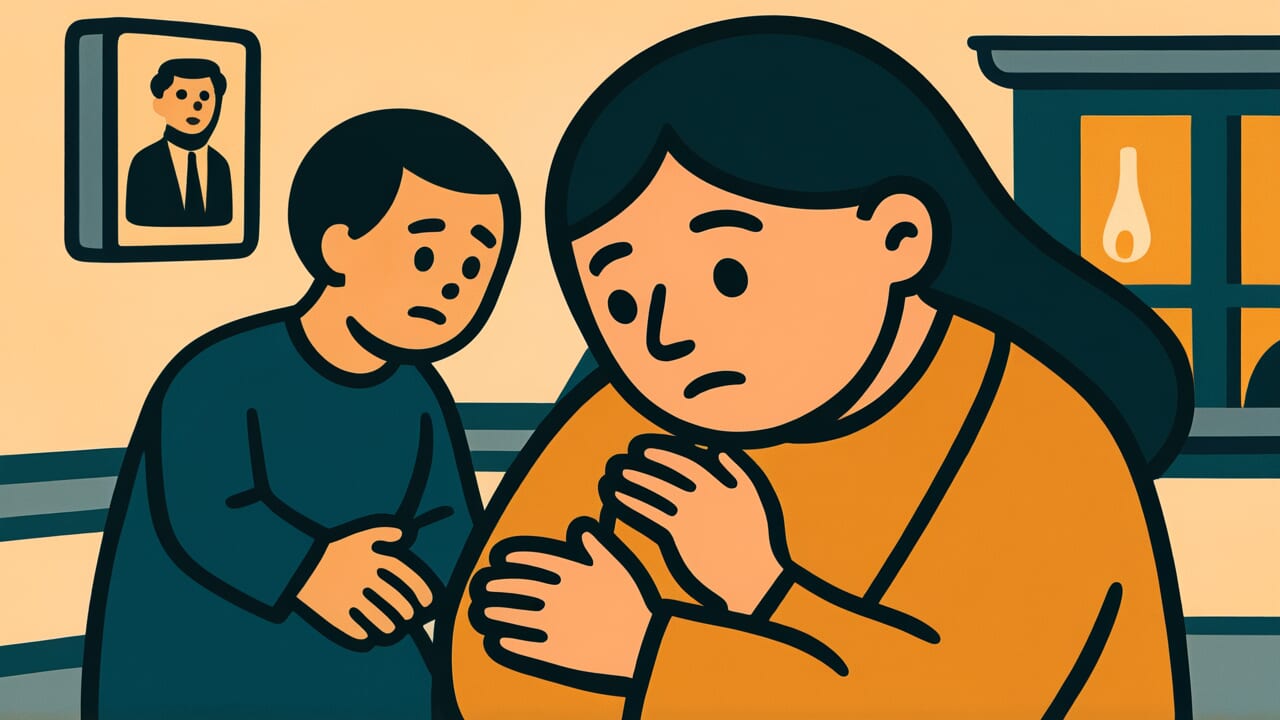How to Read “When in trouble, turn to your parents”
Setsunai toki wa oya
Meaning of “When in trouble, turn to your parents”
“When in trouble, turn to your parents” is a proverb that expresses a natural human emotion. No matter how painful or difficult your situation becomes, your parents are ultimately the ones you can rely on.
The word “setsunai” here doesn’t mean romantic longing like in modern usage. Instead, it means a suffocating, desperate state where you feel cornered and overwhelmed.
Even when you live independently, certain situations make you think of your parents. Illness, financial hardship, or relationship troubles can trigger this response. You naturally want to seek their help.
This isn’t something to be ashamed of. It’s a completely normal human feeling.
This proverb reminds us how deep the parent-child bond runs. It shows us how significant parents are in our lives.
It also teaches us something fundamental about human nature. No one can live completely alone. We all need support, and family plays a crucial role in providing that support.
Even today, people use this expression to describe the natural impulse to turn to parents when facing difficulties.
Origin and Etymology
No clear written records exist about the origin of this proverb. However, we can make interesting observations about how the phrase is constructed.
The word “setsunai” deserves special attention. Today, people write it as “切ない” to express bittersweet romantic feelings. But in ancient times, it was written as “切なし” and meant “painful” or “distressing.”
It described a state of suffocating anguish, where you could barely breathe from the pressure.
This proverb likely emerged from Japan’s traditional family system. Before the Edo period, most people spent their entire lives in their birthplace. Parent-child bonds were even stronger than they are today.
Parents served as the ultimate safety net, both economically and emotionally.
Confucian philosophy also played an important role. Respecting and honoring your parents was considered the highest virtue. But this proverb isn’t really a moral teaching.
Instead, it captures honest human feelings. Even the most independent person thinks of their parents when truly desperate. The proverb captures this emotional truth perfectly in just a few words.
It probably arose naturally from everyday life and spread through word of mouth.
Usage Examples
- I quit my job to start a business, but when it failed, I really understood “when in trouble, turn to your parents”
- When I was hospitalized, I deeply felt that “when in trouble, turn to your parents”
Universal Wisdom
“When in trouble, turn to your parents” tells us about humanity’s fundamental dependence on others. It reveals the mysterious power of blood ties.
As we grow up, we try to become independent from our parents. We want to live by our own strength. This is a sign of healthy development.
But no matter how strong we become, no matter how successful, humans cannot live completely alone. This is simply our nature.
What’s interesting is that this proverb doesn’t say you “should” rely on parents. It describes what actually happens—you “end up” relying on them. This isn’t about logic or morality.
It’s about emotion and instinct. When suffering, we seek our parents. This has been true of humans for thousands of years.
The parent-child bond contains something beyond logic. Even if you’ve been distant for years, your parents’ faces appear in your mind during real trouble.
Parents, too, cannot ignore their children’s suffering, no matter how much time has passed. This mutual connection might be a biological program we evolved to ensure human survival.
This proverb teaches us the importance of acknowledging human weakness. You don’t have to act tough. You don’t have to carry everything alone.
Having someone to rely on isn’t shameful. It’s actually a blessing.
When AI Hears This
Parents share an average of 50 percent of their genes with their children. This number is critically important in evolutionary biology. From a gene’s perspective, helping your child means protecting a copy of yourself.
Conversely, when children turn to parents, they’re instinctively choosing someone who shares half their genes. They’re selecting someone who gains genetic benefits from helping them.
What’s fascinating is how the human brain responds to crisis states like “setsunai toki.” It bypasses rational cost-benefit calculations and activates a circuit that seeks parents. Friends might betray you. Lovers might leave.
But parents face biological constraints that make abandoning children difficult, even when relationships are strained. This isn’t about emotion. It’s a survival strategy designed by millions of years of selective pressure.
Notice how this instinct activates specifically during “setsunai toki.” During normal times, people remain independent. But when life or livelihood faces genuine risk—when genetic survival is threatened—this ancient circuit takes priority.
The human brain contains a program that measures crisis severity and automatically selects the most reliable supporter. This proverb accurately identifies that precise biological system.
Lessons for Today
This proverb teaches modern people about the importance of having a “last resort” in human relationships.
Modern society strongly demands independence and self-reliance. Living by your own strength without depending on anyone is often seen as a virtue.
But this sometimes creates loneliness. It can lead to situations where people feel cornered but can’t ask anyone for help.
Turning to your parents isn’t weakness or dependency. Actually, knowing your limits and asking for help appropriately shows true strength. No one is perfect, after all.
This proverb also carries an important message for people in the parent role. Being someone your children can turn to, no matter how old they get, when they’re in trouble—that might be the most important parental role.
For those without parents or who cannot rely on them, you can find parent-like figures in life. A mentor, a senior, a friend.
Carefully nurturing relationships with people who accept you unconditionally enriches your life. It gives you strength to overcome difficulties.



Comments